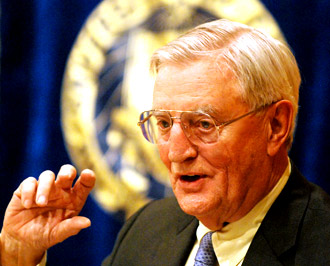Mondale: Connecting the dots between U.S. security and foreign development aid
Former vice president and presidential candidate argues, amiably, for increased financial assistance to nations in need
| 18 September 2009
BERKELEY — Walter Mondale, who served as Jimmy Carter's vice president for four years, was swept from office by Ronald Reagan and George H.W. Bush, and made his own unsuccessful run for the White House in 1984, drew laughs at Berkeley on Wednesday when he suggested that students consider a career in politics.
 Walter
Mondale (Peg Skorpinski photo)
Walter
Mondale (Peg Skorpinski photo)In an event sponsored by the Blum Center for Developing Economies, the 81-year-old Mondale invoked the spirit of the Peace Corps as he argued the case — though "argued" might be too strong a word for the mild-mannered Minnesotan, who goes by the nickname "Fritz" — for U.S. development aid to countries in need. Although many of his Sibley Auditorium listeners were old enough to remember when he was still a U.S. senator — carrying the banner of Kennedy-era Democratic liberalism — he focused largely on the student contingent.
"There is such a need for young people," he told them, to work toward "a more open and hopeful world," and to make America "more effectively engaged in giving people around the world a better chance."
"I would like to see us not only train you about this issue," Mondale said, "but to find some way to make it possible for you to use your talents and your energy and your idealism to make a difference."
Mondale, who served as President Clinton's ambassador to Japan, is widely regarded as having expanded the portfolio of American vice presidents. He traveled extensively on behalf of President Carter, and took part in the Camp David peace agreement between Egypt and Israel, before the Soviet invasion of Afghanistan and the Iranian hostage crisis combined to usher in Republican control of the White House.
His message at Berkeley — where, he recalled, he "had the best rally in the country" during his 1984 presidential run — was that foreign aid is "more essential than ever" as a means to greater U.S. security and to more stable, democratic nations abroad.
"Evidence is now overwhelming that poverty contributes to violent conflict, helps the spread of infectious diseases, and threatens global income growth and causes environmental damage," Mondale said. He welcomed what he characterized as the enlightened view of the new generation of U.S. military leaders in places like Iraq and Afghanistan, who recognize, he said, that "Western military power by itself isn't gonna hack it."
"In order to defend America from her threats," Mondale declared, "America has to become much more effective in developing economic and other opportunities for these nations."
Yet convincing voters of the need for foreign development aid, he acknowledged, is a dicier proposition.
"Over the years it's been fairly easy to arouse American support for spending money and getting involved to help people in desperate need," said Mondale, citing the overwhelming response to such natural disasters as the 2004 tsunami in South Asia. Development aid, on the other hand, is "profoundly different," and "a much more difficult sale to the American people."
Toward the end of his talk, Mondale again addressed himself to the students in the audience, bemoaning the "disconnect" between their training and interest in foreign development and career opportunities in the field. Moments later, before opening the floor to questions, Richard Blum — the center's founder, a UC regent, and the husband of U.S. Sen. Dianne Feinstein (D-Calif.) — paused the proceedings, announcing that "I just had an idea."
"Maybe, if people here or wherever were willing to sign up for the Peace Corps or [the Agency for International Development] for a period of time," he suggested, student loans could be forgiven at 25 percent a year.
"I'll see if I can get legislation introduced," said Blum.
"Do you know somebody?" wondered Mondale.

